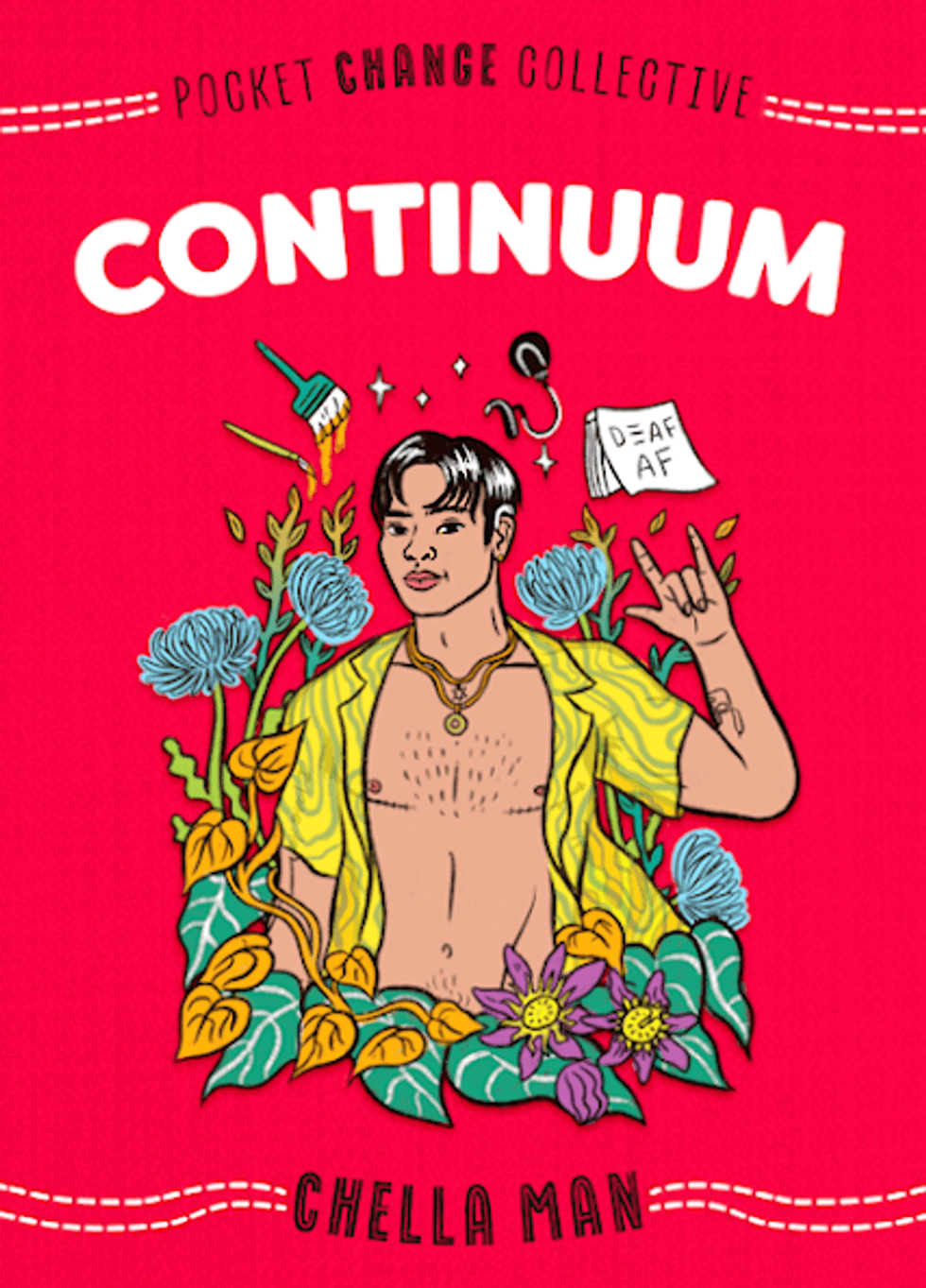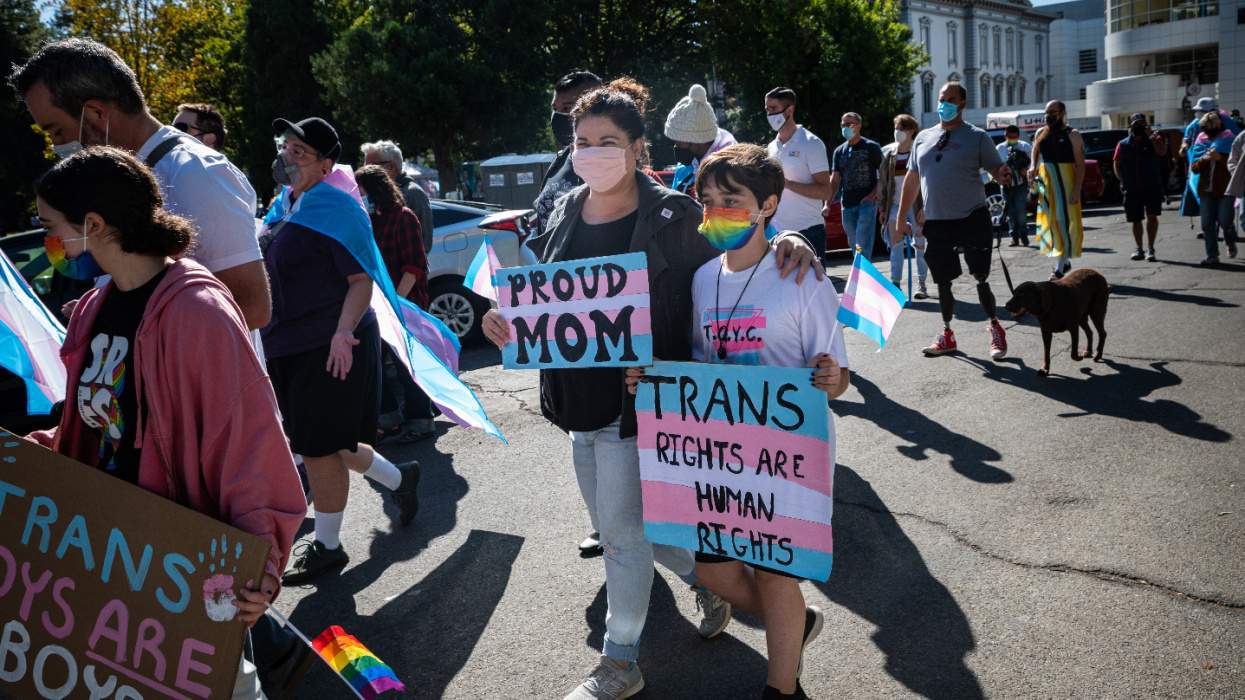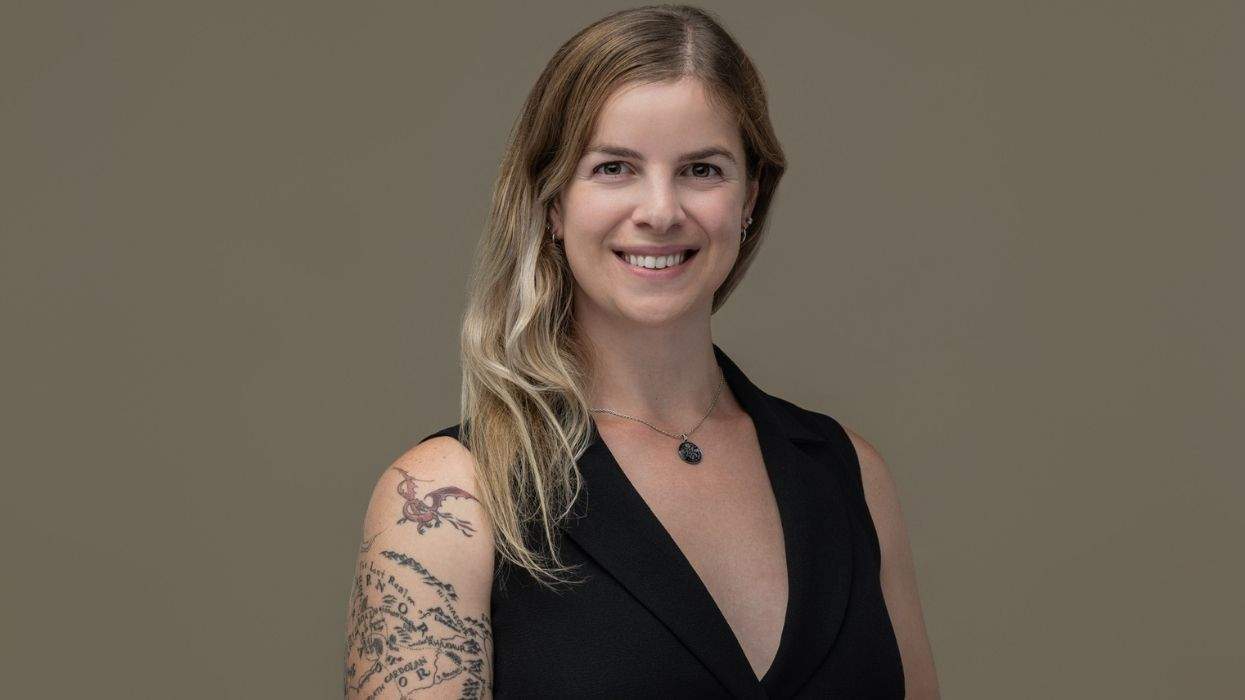Professionally and personally, Chella Man holds many identities. The trans, genderqueer, pansexual Chinese and Jewish artist is also an activist, model, an actor (he played the superhero Jericho on the DC show Titans), and a YouTuber with over 250,000 subscribers. Now he's adding "author" to that list with the debut of his first book, Continuum.
In it, Man writes, "My disability was interpreted as a medical issue, producing conversations and resources. But when it came to my gender and sexuality, the world went dark." He turned to the internet, finding resources and eventually community, and notes how important tattoos have been in making him feel more at home in his body. "Before I was able to access hormones and top surgery, tattoos were this way I could reclaim my body and redesign it before that," he says on the LGBTQ&A podcast. "Also being an artist, of course, I want autonomy to doodle all over myself. And so that's essentially what I did."
On this week's LGBTQ&A podcast, Chella man describes the meaning behind his first tattoo, choosing to get cochlear implants, and why he's more comfortable not wearing them. "It's honestly more comfortable for me to be completely deaf...as much as I can, honestly, I take them off. It feels more natural to me."
Read an excerpt below and listen to the full interview on Apple Podcasts or Spotify.
Jeffrey Masters: Did you make the choice to have cochlear implants? Or were you too young and it was a decision made for you?
Chella Man: A lot of kids don't get the choice, but my parents intentionally did a lot of research about the controversy within the deaf community about cochlear implants. And they wanted me to have the decision myself. So for a long time growing up, they asked me once every single year at least like, how do you feel about getting cochlear implants now? And I would always be deeply opposed to it.
Looking back, I think it was probably due to internalized ableism and just wanting to be autonomous and independent, not needing help, et cetera. But it got to a point where, because I was immersed in a hearing environment, I literally could not communicate. And I was starting to become more and more isolated with no one deaf around me and anyone who signed. So it kind of did feel like my only choice at that moment. So when I was 12 years old, that's when I decided to get my first cochlear implant, which is on my left side. And then when I was 14, I got one on my right, which unfortunately failed. And I had to get this surgery again when I was 16.
JM: Before reading your book, my assumption was that since you have cochlear implants, that you would have perfect, 100 percent hearing, that you wouldn't need to think about it. You say you can hear somewhat.
CM: Exactly. It's a huge misconception. I always compare it to...have you ever taken a video outside when it's windy? You know how when you play it back later, how that wind sounds? That's just how I hear in general. So everything is very mechanical. I always say, I don't have any more human hearing necessarily. It's just very mechanical.
JM: In a way, your disability is made visible with the cochlear implants. Is that helpful or does it create issues?
CM: I don't think people really understand what they're looking at, to be honest. I have a lot of people come up and ask me about where I got that Bluetooth earphone or something like that. A lot of times, if people do notice it, they don't know what it is. And then most of the time, honestly, people don't because it tends to blend into my hair color. I often feel like even if I am wearing my cochlear implants, my disability is still invisible. The main times I feel like it isn't is when I'm signing. That's very clear that I'm deaf because that is the stereotype that people often associate with being deaf.
JM: You live in a loud city. How often do you remove them?
CM: It's a superpower. I love it. If there's a baby crying on the plane, boom, out. Whenever I was taking tests growing up, total concentration.
It's honestly more comfortable for me to be completely deaf. But in some cases, I just can't because of the environment and the world we live in is very hearing-based. So I'll have them in, but there is obviously ways to navigate the world without ever even hearing a single bit of sound. But for me personally, as much as I can, honestly, I take them off. It feels more natural to me.
JM: At what point growing up, did you start to feel she/her pronouns weren't the right fit?
CM: For as long as I can remember. I apparently would tell my mom as soon as I could speak that I wanted to be a boy and I wanted her to call me he.
I don't think it's actually about the language. I think it's about the feeling. It's about who you are inside. And language is something that allows you to articulate what you're feeling inside, but you always already have that, who you are inside. Language comes after.
JM: It was all about wanting to be a boy. When did you realize your gender was more expansive than that?
CM: I think I realized just because the gender binary, in general, is completely ridiculous. There's so much more diversity and things to experience and people to be. Why would you ever want to choose one? And also I genuinely believe that we're all nonbinary, to an extent, because we just don't all fit this stereotype, like, Oh, you like blue, OK. You're a boy. Oh, you like this kind of fabric hanging on your body, OK, that means this. No, I just want to discard all the limitations and just allow us to be who we are. That's the goal. That's the end goal.
JM: In terms of laying claim to your body and changing your relationship to it, how important were tattoos in that?
CM: So important. Before I was able to access hormones and top surgery, tattoos were this way I could reclaim my body and redesign it before that. But in addition, also being an artist, of course, I want autonomy to doodle all over myself. And so that's essentially what I did. As soon as I could legally, I got my first tattoo on my 18th birthday. And every single one I've gotten since then has such deep meaning that I don't think I'm actually ever going to get anymore. I always considered top surgery to be my last tattoo.
JM: Do you consider top surgery to be as significant as your tattoos?
CM: Absolutely, absolutely. Because what are tattoos essentially? Tattoos are something that you intentionally choose to have on your body. With top surgery, I knew that I was getting the double incision surgery and that I was going to have these two scars and they're something intentional that I chose and I wanted. And they symbolize so much. They symbolize how far I come. The fact that I'm still alive, what this means for my future, and who I am now. So I consider them tattoos.
JM: What was your first tattoo?
CM: Well, when I was 14, I did a stick and poke on my right hip. It's three dots because I've always signed my artwork with three dots. I never really understood why people would want their names on their artwork in the front. I just feel like that takes away from the art. So instead, I always try to incorporate three dots. So people would somehow know it was me without me just slapping my name on the front. I was like, okay. I signed all my artwork with three dots. Why not have it on myself, as well? Because I am art.
It looks pretty bad and faded, but it's perfect. I would never go over it.
JM: Do you find that people and society weigh certain identities of yours more? That you're seen as only trans or only deaf or only Chinese in different spaces?
CM: Absolutely. What people highlight about your identity shifts depending on the environment you're in. That's true with anyone. I'm definitely all of the above, but I'm also creative, passionate, empathetic, goofy, tired, sometimes hungry. I'm a lot of different things, but one of those won't ever rise above. I just am all those things.
Listen to the full podcast interview on Apple Podcasts or Spotify.
Continuum by Chella Man is available now.
LGBTQ&A is The Advocate's weekly interview podcast hosted by Jeffrey Masters. Past guests include Pete Buttigieg, Laverne Cox, Niecy Nash, and Roxane Gay. Episodes are released every Tuesday.
















Charlie Kirk DID say stoning gay people was the 'perfect law' — and these other heinous quotes
These are some of his worst comments about LGBTQ+ people made by Charlie Kirk.